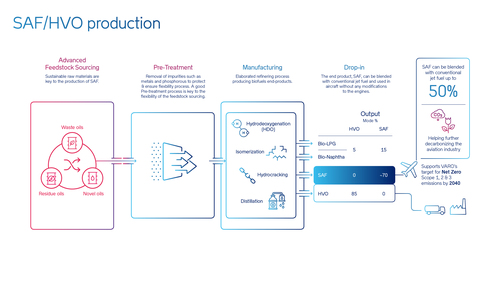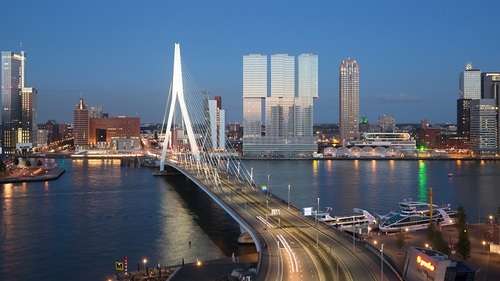To Meet 7% of EU's 2030 SAF Target VARO Invests $600m to Build Major Sustainable Aviation Fuel Manufacturing Facility in Rotterdam, The Netherlands
- Constructing major large-scale Sustainable Aviation Fuel manufacturing facility: 100% owned by VARO with capacity to produce 245 kt p.a. of Sustainable Aviation Fuel (SAF).
- Delivering up to 7% of EU 2030 SAF target: helping to accelerate the EU’s decarbonization agenda in a hard-to-abate sector.
- Supporting airline customer’s decarbonization: SAF has on average 90% less greenhouse gas (GHG) emissions compared to conventional jet fuel. In February, VARO signed an MOU with Lufthansa to provide SAF from 2026 onwards.
- Investing $600 million (approx. €560 million) funded by VARO with first production in Q4 2026. This investment is expected to create up to 70 high-skilled green jobs.
- Progressing ONE VARO Transformation strategy: advanced biofuels is one of VARO’s five strategic growth pillars and this announcement is a significant milestone in its journey to produce >250kt p.a. of net biofuels capacity by 2026 and its long-term ambition to reach > 500kt p.a.
Zug, — VARO Energy (“VARO”) today announces the construction of a large-scale Sustainable Aviation Fuel (SAF) manufacturing facility at the Gunvor Energy Rotterdam site, investing $600m with the aim of helping its airline customers decarbonise. This facility alone is expected to contribute up to 7% of the EU’s 2030 SAF target.
The 100% VARO-owned facility features a world-class pretreatment unit, guaranteeing renewable feedstock flexibility and production optimisation capability. The facility will have a total feedstock capacity of 350 kt p.a., with a SAF production capacity of 245 kt p.a. alongside a mixture of bio-naphtha and bio-propane.
Aviation is a vital part of the global economy, connecting people and businesses around the world. But the industry is also one of the fastest growing sources of greenhouse gas emissions. Through this investment VARO is supporting the aviation sector’s decarbonisation by manufacturing the SAF that airlines need to meet their targets. This is at the heart of the ‘Customer Lighthouses’ which have been established by VARO to support customers in the ‘hardest to abate’ industries, such as aviation, in their energy transition. The first of these was announced with Lufthansa and VARO in February.
Made from waste and renewable biomass sources, SAF is a viable and scalable low carbon solution for the aviation sector. This investment by VARO will provide more airline customers with access to SAF, which can be used in the current generation of aircraft and utilises the current fuelling infrastructure.
According to the IEA, European jet fuel demand is set to grow by more than 20% over the next five years. Located in Rotterdam at the centre of one of the world’s major aviation hubs, VARO’s new SAF manufacturing facility will be well positioned to meet this demand growth. As well as benefiting from close proximity to major markets the facility is also located alongside port infrastructure, wastewater treatment, as well as existing road, rail and pipelines, enabling SAF production and distribution.
Production is expected to commence by Q4 2026, enabling VARO to contribute to the significant growth in European SAF demand expected in the coming years. In a scenario of European SAF demand hitting 3.5 mt p.a., this manufacturing facility alone could provide up to 7% of the EU’s 2030 SAF mandated target of 5% by 2030.
SAF is part of VARO’s biofuels business, one of the company’s five strategic growth pillars under its ONE VARO Transformation strategy alongside biomethane and bio-LNG; hydrogen; e-mobility; and carbon removals. These five pillars play to VARO’s traditional strengths while offering some of the most attractive low carbon growth potential offered by the energy transition.
Dev Sanyal, CEO of VARO, said: “The development of a large-scale SAF manufacturing facility in Rotterdam, at the centre of one of Europe’s most significant aviation hubs, is an important milestone in the development of the ONE VARO Transformation strategy. This $600 million investment strengthens our leading position in biofuels in Europe by adding SAF production to our portfolio of solutions and will provide our airline customers with an important route to decarbonization. With the potential to produce around 245 kt p.a. of SAF when it comes onstream in 2026, this new manufacturing facility alone will provide up to 7% of the EU’s 2030 SAF target. I would like to express my appreciation to Gunvor for the excellent cooperation and we look forward to working with them.”
About SAF
Sustainable Aviation Fuel is a ‘drop-in’ fuel. It is compatible with existing aircraft and fuel logistics infrastructure without requiring any modifications. At scale, SAF has an important role to play in helping the aviation industry decarbonise. Used as a direct replacement for conventional aviation fuel, SAF that will be produced offers up to 90% Greenhouse Gas (“GHG”) savings allowing the commercial aviation sector to decarbonise the vast majority of its emissions.
Categories
Investments
2023-01-01
€ 560 mln at Port of Rotterdam (NL)Latest news
Ports of Duisburg and Rotterdam advance energy transition together
Port of Rotterdam →With this LoI, the two major European logistics hubs reinforce their goal of jointly developing sustainable transport corridors via waterways as well as future-oriented initiatives for the energy t...
BASF constructs new electronic grade ammonium hydroxide plant in Ludwigshafen
BASF SE, Ludwigshafen →State-of-the-art facility to support the development of the advanced European semiconductor industry. New capacity meets growing demand for the manufacturing of chips in Europe
SynPet Technologies to bring emerging technology in plastics recycling to the Port of Antwerp-Bruges
Port Of Antwerp →SynPet Technologies is investing €300 million in an innovative facility that converts all types of plastics into a circular naphtha substitute without pre-treatment and with efficient conversion ra...
NEXTCHEM awarded a feasibility study by Mana Group and Equinor for the production of sustainable fuels in Norway leveraging its NX Circular™ technology
With the support of NEXTCHEM, Mana (NG Nordic) and Equinor are entering an early-stage strategic partnership to explore the potential development of the Nordics' first large-scale waste-to-methanol...

